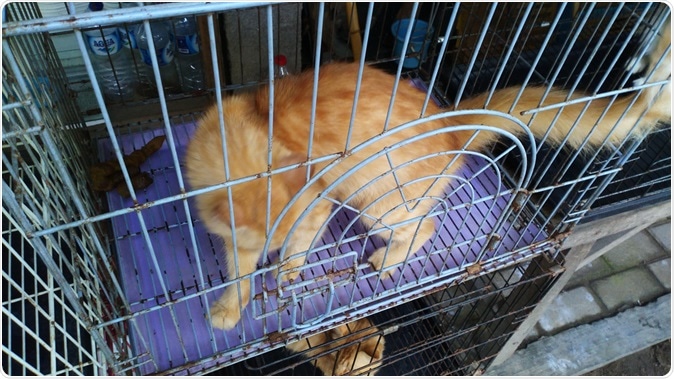A shocking new report from a nonprofit organization called The White Coat Waste Project published this week found that the U.S. Department of Agriculture (USDA) has been conducting some abhorrent and bizarre experiments with cats and dogs.

Image Credit: Shutterstock
USDA experiments using cats and dogs questionably procured abroad include:
- 42 cats purchased at Chinese pet markets and meat farms, killed, and their hearts and tongues shipped to APDL in Beltsville, MD and injected into mice
- 48 stray cats rounded up in Ethiopia, killed, and their hearts shipped to APDL in Beltsville, MD and fed to mice
- 34 cats purchased at a Chinese meat market, killed, and their tongues, brains, and hearts shipped to APDL in Beltsville, MD and fed to ARS cats
- 309 dogs acquired from a shelter in Colombia killed and their brains, tongues and hearts shipped to APDL in Beltsville, MD and fed to ARS cats
- 120 unclaimed Brazilian shelter dogs killed and the tongue, brain and hearts of 20 of them fed to ARS cats
- 42 dogs destined for a Vietnamese meat market were purchased and killed. The hearts, brains and tongues of some of these dogs were shipped to APDL in Beltsville, MD and fed to ARS cats
The USDA, the report claims, purchases cats and dogs from the meat markets for their experiments. The cats were fed to cats in the disgusting experiments and parts of them are being injected into laboratory mice. The USDA's Agricultural Research Service is allegedly performing these experiments with no perceivable benefits for the public says the report.
The USDA claims to be performing these experiments as part of research for toxoplasmosis. Toxoplasmosis is caused by a common parasite Toxoplasma gondii. Lead author of the report Justin Goodman who is also the vice president of The White Coat Waste Project said toxoplasmosis is a common parasitic infection. The Centers for Disease Control and Prevention (CDC) says it is one of the leading cause of mortality due to a foodbourne illness. The infection can spread by consuming undercooked meat etc. which is contaminated with cysts of the parasite. Drinking contaminated unpasteurized goat milk is also a mode of contracting this infection. Cats consume rodents and birds infected with the parasite. From the cats the oocysts of the parasite can spread. The cats shed millions of these cysts in their stool for weeks. This makes spread of the infection likely among humans and other animals around them.
Goodman explained the USDA was feeding hearts, brains and tongues of dogs and cats from abroad to the domestic cats to understand the spread of the infection. But “these kitten cannibalism experiments have absolutely no relevance to human or animal health and, frankly, sound more like an entry in the diary of a burgeoning serial killer than anything else,” he said. The report claims that these experiments began in 2003 and have been on till around 2015. Goodman said that they do not have reports of these experiments being still conducted.
Goodman said along with these experiments were those conducted in the USDA's Agricultural Research Service's Animal Parasitic Disease Laboratory (APDL) in Maryland. The White Coat Waste Project alleged that around 4,000 kittens have been killed as a result of these experiments.
The USDA allegedly spent $22.5 million on these experiments says the report. “USDA kitten toxoplasmosis experimentation causes unnecessary animal pain and suffering, little or no scientific benefit, and wastes millions of taxpayer dollars as a consequence of non-competitive perpetual intramural federal funding,” the report says. Goodman said, “This is not experimentation that's being cited [or] that's improving public health, and it certainly doesn't deserve the support of American taxpayers. They don't need to ever touch a single cat again to continue studying toxoplasmosis research.” Goodman pointed out that the USDA has not yet come forth with an explanation after this report was released.